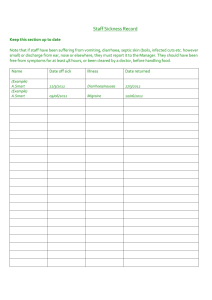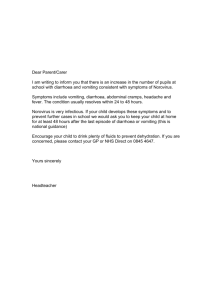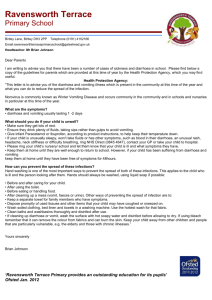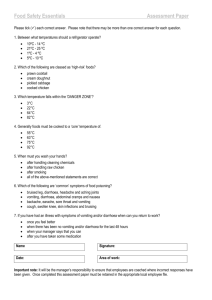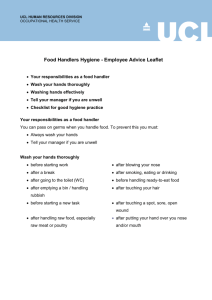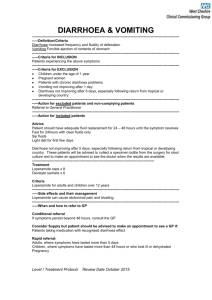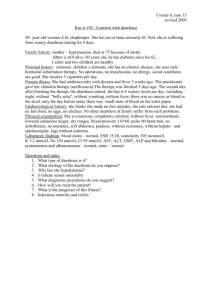Preventing the Spread of Sickness and Diarrhoea Stomach upsets
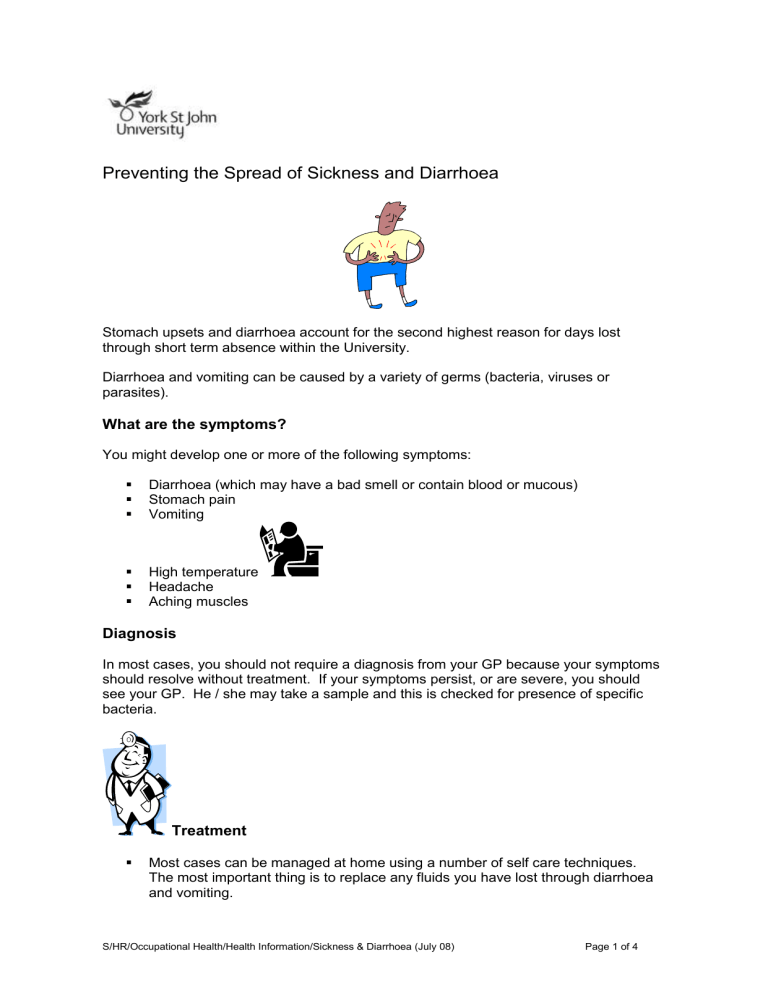
Preventing the Spread of Sickness and Diarrhoea
Stomach upsets and diarrhoea account for the second highest reason for days lost through short term absence within the University.
Diarrhoea and vomiting can be caused by a variety of germs (bacteria, viruses or parasites).
What are the symptoms?
You might develop one or more of the following symptoms:
Diarrhoea (which may have a bad smell or contain blood or mucous)
Stomach pain
Vomiting
High temperature
Headache
Aching muscles
Diagnosis
In most cases, you should not require a diagnosis from your GP because your symptoms should resolve without treatment. If your symptoms persist, or are severe, you should see your GP. He / she may take a sample and this is checked for presence of specific bacteria.
Treatment
Most cases can be managed at home using a number of self care techniques.
The most important thing is to replace any fluids you have lost through diarrhoea and vomiting.
S/HR/Occupational Health/Health Information/Sickness & Diarrhoea (July 08) Page 1 of 4
You should aim to drink at least two litres of water a day as well as 200 mls every time you pass a loose stool.
If you are more vulnerable to the effects of dehydration, for example if you are elderly or have another pre-existing health condition, oral rehydration salts are recommended.
These are available from pharmacies. You should dissolve them in water and they help you to replace salt, glucose and minerals that your body loses through dehydration.
Some types of rehydration salts may not be suitable if you have a kidney condition
– ask your pharmacist or GP for advice about this.
If dehydration is severe, hospital treatment may be necessary.
Preventing the spread of diarrhoea and vomiting
Vomit due to viral infection is infectious. All contaminated surfaces should be cleaned immediately. If you feel there is some contamination of clothes it is best to change clothes and launder the soiled clothes in a hot wash. Wash and clean your face after being sick. Thoroughly wash your hands afterwards.
In the bathroom :
After using the toilet:
Ensure all surfaces are clean
Use disinfectant to clean the toilet bowl, flush handle, taps, door handles and light switches.
Use separate towels for all members of the family
Provide paper towels for hand drying in the bathroom
Any accidents on the house should be cleaned up straight away
In the kitchen:
Do not:
prepare or handle food for others, including babies, if you have sickness and diarrhoea.
share utensils, cups, crockery, glasses etc. with others
Prevention
Wash your hands
Wash your hands thoroughly with soap:
before starting to prepare food
after touching raw meat, poultry, fish and other raw foods
after going to the toilet
whenever you help your child (or a relative you are caring for) to use the potty or toilet
b efore and after changing baby’s nappies
S/HR/Occupational Health/Health Information/Sickness & Diarrhoea (July 08) Page 2 of 4
after gardening
after removing outdoor shoes / wellies
before feeding your baby or child
after handling rubbish and touching the bin
after touching pets, pets food, utensils or litter trays
after handling soiled clothing or linen
after cleaning up faeces and vomit
before and after dressing wounds
How to wash your hands
First wet your hands
Use plenty of soap and water and rub all over the hands. Liquid bactericidal is the most effective
Bacteria hide in creases and under nails, so give special attention to finger tips, thumbs, between the fingers, the backs of the hands and the creases in the palm.
Ensure that your nails are clean
An alcohol gel used on physically clean hands will help to kill any bacteria present, but should not be used as an alternative to hand washing using running water and soap.
It is important to dry your hands thoroughly. If they are wet, they will spread bacteria more easily.
The safest option is to use disposable kitchen or paper towels, otherwise use a towel that you only use for drying your hands.
The number of germs on the fingertips doubles after using the toilet. Half of all men and a quarter of women fail to wash their hands after they have been to the toilet!
S/HR/Occupational Health/Health Information/Sickness & Diarrhoea (July 08) Page 3 of 4
How can you avoid being ill again?
Wash hands thoroughly before handling food and always after handling raw meat, going to the toilet, blowing your nose or handling animals.
Keep food preparation surfaces and utensils clean and disinfected
Prepare and store food raw food and ‘ready to eat’ food separately. Always keep raw and defrosting meat at the base of the fridge, below everything else.
Ensure your fridge and freezer are operating properly. Invest in a suitable thermometer. The fridge should operate at 5 degrees C or lower and the freezer at -18 degrees C or lower.
Check the ‘use by’ dates on food and make sure you use the food before the expiry date.
Keep pets away from food and food preparation surfaces.
Defrost food, particularly meat and poultry thoroughly before cooking
Cook food thoroughly. Follow the manufacturers guidelines on prepared food and ensure that all cooked food is piping hot throughout before consumption
Cool food immediately after cooking and never allow it to be at room temperature for more than four hours. Always store leftover food in the fridge as soon as it has cooled to room temperature
S/HR/Occupational Health/Health Information/Sickness & Diarrhoea (July 08) Page 4 of 4
